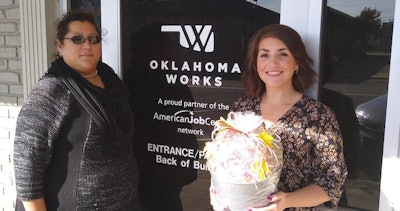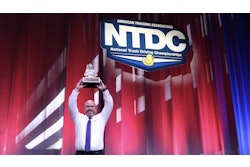
 Bobbie Wolf, left, celebrated her business’ grand opening by giving away gift baskets. (Image Courtesy of Facebook/Heavy Metal Training Institute)
Bobbie Wolf, left, celebrated her business’ grand opening by giving away gift baskets. (Image Courtesy of Facebook/Heavy Metal Training Institute)Bobbie Wolf’s Heavy Metal Training Institute celebrated its grand opening at its downtown Vinita, Oklahoma storefront Oct. 4. While her business may be new, Wolf is no stranger to truck driver training.
Wolf has four years of experience as a CDL instructor. She is a citizen of the Cherokee Nation and Seneca-Cayuga Nation and when the Eastern Shawnee Tribe received a grant in partnership with the Grand Gateway Economic Development Association in Northeast Oklahoma to open a CDL training program, the tribe was somewhat caught off guard, Wolf says. But Wolf had a background in both mechanics and education, and the tribe tapped her to oversee the program.
“There were a bunch of different courses, actually like seven different courses that were supposed to happen under this new training school. When they got awarded the grant everyone was busy,” Wolf said.
The tribe wasn’t sure how they were going to get the program up and running. “So that’s where my name got popped up. They hired me to put things together. I read the grant. They told me what needed to happen, that I needed to open up a school and do training. So I did. I applied for licenses and stuff like that and opened up a vocational training school in six months. And I did it all by myself.”
Before the vocational training school got started Wolf didn’t have any CDL experience, so she sought out a CDL examiner in Oklahoma to teach her and help her structure a program. Wolf is a self-described workaholic and she got busy absorbing as much information as she could.
“He was pretty amazed how I picked it up so quickly but I’m just that way. I’ve just got high mechanic abilities and I can absorb stuff really well and I understand it. That’s the same way it was offshore” said Wolf, who also previously worked as an offshore demolition team diver in addition to mechanics and education. “I pull my own load and then some. That’s the mentality you have to have with truck driving because it’s a pretty solo job. Once you get out there you have to be able to figure things out. You have to be a problem solver. You have to be resourceful and pay attention, be alert, stay calm. It all comes together.”
The CDL training course was her program’s most popular offering, with a waitlist of over 50 students. When the grant ended after about four years Wolf still saw a need for local CDL training. There was limited space on tribal property so Wolf and the tribe came to a mutual decision to close the program, and Wolf was awarded the equipment.
“They transferred the equipment over to me, and I opened up my own school,” Wolf said.
 Heavy Metal Training Institute’s storefront. (Image Courtesy of Facebook/Heavy Metal Training Institute)
Heavy Metal Training Institute’s storefront. (Image Courtesy of Facebook/Heavy Metal Training Institute)Wolf is currently the sole instructor at Heavy Metal Training Institute, though she’s looking to recruit more help. Her four-week CDL training program runs for 160 hours. She places an emphasis — about 35-40 hours — on teaching her students how to properly pre-trip, since she says that’s where many students struggle the most. Wolf also partners with local businesses to provide CDL training to their employees.
Wolf doesn’t want to just teach her students how to drive a tractor-trailer. She wants to prepare them for life over the road, and she starts by not allowing her students to eat fast food and discouraging them from smoking. She provides a pantry at her business’ downtown Vinita location, which is stocked with food donations from local businesses.
“I keep a kitchen here and we have different businesses that will donate. We have a student pantry that we fill for every class. So I’ll have a business that donates and just fills it up for them so if they want to go in there and have a snack or if I have people from out of town,” Wolf said.
Within the next three to five years Wolf wants to purchase 40-50 acres to expand her program. Her big vision is to have a facility that houses all of her institute’s offices and programs with training grounds out front, onsite diesel mechanic training, heavy equipment training, welding training, and possibly even dive training — a nod to her previous career. She wants to have two-room cabins built on the property to provide a community for out of town students needing a place to stay.
“That’s the big vision, to have a big area like that,” Wolf said.
Wolf said she treats her students like family, inviting them to her home for game nights, hosting barbecues, and providing them with food. Native culture centers on family and helping others when you can, and Wolf brings those values to her training program. She credits her parents for her work ethic and for teaching her “to help others that are willing to help themselves.”
“I just really want people to be comfortable. I want them to be relaxed and learn things and enjoy themselves while they’re here, because that’s valuable to me,” Wolf said. “As long as I know that they’re happy and everything is comfortable and they’re learning what they’re supposed to learn and getting what they’re supposed to get and opening a new door for themselves, that’s what I want to see. That’s the most rewarding.”
Many of Wolf’s students come from low-income situations and are down on their luck. She herself is a single mom so she knows what it’s like to struggle, and she tries to ease her students’ burdens. She works with the local government workforce development office to help her students identify funding opportunities.
“I’ve been there. Twenty years ago I was the person that didn’t know how I was going to pay my bills. I had an expired license and I knew I had to get to work because I had a baby and you know you have all of these responsibilities and that pressure and stress, and I would’ve given anything for somebody to reach their hand out and give me some kind of opportunity. That’s what I try to do for people because it’s rough out there” Wolf said. When the going gets rough you have to take action, she says. “My philosophy on everything is you have to be willing to help yourself and if you are somebody’s going to recognize it, and I see that in people.”










